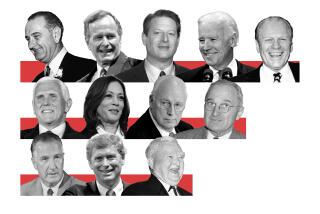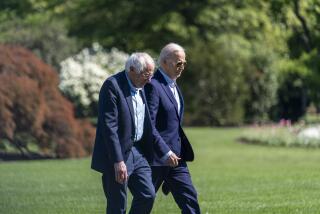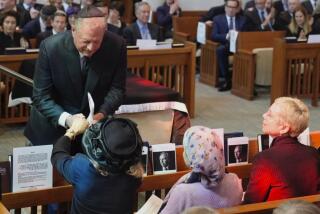No. 2 Rising to an Almost-Unlimited Partnership
WASHINGTON — When he ponders the duties of America’s next vice president, Al Gore has just the role model in mind: himself.
Gore is widely regarded as the most influential and powerful vice president in history. But if the Democrats win the election just 18 days from today, Gore says he intends to expand to an unprecedented degree the duties of that office for his running mate and longtime friend, Joe Lieberman.
Indeed, earlier this summer, Gore privately told Lieberman--as well as the five others he seriously considered as a running mate--that he intends to forge with his understudy “a full partnership . . . and have the kind of approach that Clinton and I have had . . . and then build upon that and take it even farther.”
But his declared intentions to empower Lieberman drew some guarded skepticism--even from some Gore-Lieberman partisans who are well aware of Gore’s inclination to be a domineering, detail-oriented micromanager.
“We’ll see,” said one former senior Gore staffer, who recently took some time off from a private sector job to help the campaign.
As Clinton and Gore set out during the transition period to build their administration, the president-elect made Gore virtually a full partner. He even gave Gore a say--including veto power, which Gore wielded--in top presidential appointments. As a result, many of Gore’s trusted aides received key jobs, such as Carol Browner, named to head the Environmental Protection Agency, a job she still holds.
And in an extraordinary move, Clinton granted Gore’s senior aides the coveted title of “assistant to the president,” even though they technically were only on the vice president’s staff.
Another issue agreed to was an all-but inviolate lunch between Clinton and Gore every Wednesday.
And at his very first Cabinet meeting, Clinton delivered the icing on Gore’s cake, declaring: “Look, let me get one thing settled off the bat. When the vice president speaks, assume he’s speaking for me.”
Involvement a Stark Contrast to Others
Gore’s day-to-day, roll-up-the-sleeves involvement at the White House was not only unprecedented but a stark contrast to roles played by his more recent predecessors, namely Dan Quayle and George Bush, who typically found themselves out of the loop on key matters.
Gore was asked to discuss his intentions for his potential vice president at a time when Dick Cheney, the Republican vice presidential candidate, is seen by many as a lackluster candidate--but someone who could ably carry out the duties of the nation’s second-highest office. Cheney has held senior positions in prior GOP administrations, including as President Ford’s chief of staff and President Bush’s Defense secretary.
While Lieberman, 58, has proved to be a far more engaging campaigner than Cheney, the senator from Connecticut lacks the executive branch experience that Cheney possesses.
While Gore and Lieberman have not yet discussed in detail Lieberman’s potential duties as vice president, the senator harbors no doubt about Gore’s intentions.
“Generally speaking, of course I hope that he entrusts me with as much responsibility as President Clinton entrusted him. And I’m confident that he will,” Lieberman said in an interview.
“But exactly what I’d do will be totally up to him. But I don’t worry about it, because I think it will all work out.”
Gore Says Details to Be Worked Out Later
In an interview, Gore was loath to publicly detail his plans for the office that he now holds, adding that the proper time to focus on those matters is during a transition.
For now, he added in the interview, both he and Lieberman are simply “concentrating on winning the election.”
Gore did, however, leave one matter emphatically clear.
Although he and Lieberman do not agree 100% on such issues as tort reform, school vouchers and affirmative action, Gore expects Lieberman to support his positions when such matters arise.
Taking a page from his own conduct in the last 7 1/2 years when he disagreed with Clinton, Gore said: “Well, you make your case in private and then you support the administration’s policy to the best of your ability.”
The vice president said it should not be surprising that he and Lieberman--in the thick of a hotly contested campaign--have yet to discuss Lieberman’s role in a Gore White House.
In their June 30, 1992, meeting, shortly after then-Gov. Clinton had clinched the Democratic presidential nomination, the two talked for three hours. But they focused almost entirely on issues and campaign strategy.
“It was a very absorbing and interesting conversation,” Gore recalled. “But we didn’t talk about the job of vice president in any great detail until after the election.”
That conversation did not take place until December, when the men and their top advisors gathered around a table at the Governor’s Mansion in Little Rock, Ark.
“The president was really good about involving Gore, making sure he was up to speed, and consulting him before decisions were made, most of the time,” recalled a senior Gore staffer.
Still, Gore did not get everything he had hoped.
It was First Lady Hillary Rodham Clinton who won the coveted assignment of leading the White House health care reform task force, which was to have been the crowning achievement of Clinton’s first term.
But given the effort’s abject failure, which led to the Republican takeover of Congress in the 1994 elections, Gore probably does not rue his back-seat role in health care reform.
Gore’s Empathy Would Benefit Lieberman
Because of his own experiences as vice president, Gore is likely to be especially sensitive to Lieberman’s situation, should they win on Nov. 7, said Washington lobbyist Roy Neel, who was Gore’s first vice presidential chief of staff.
“He has acquired a good sense of how a vice president can be useful in an administration,” Neel said.
Time and again, for instance, Gore weighed in on national security matters, such as goading a reluctant Clinton to finally take action in Bosnia.
And in the current Middle East crisis, Gore abruptly curtailed his campaigning twice this month to rush back to the White House.
Neel believes that Gore and Lieberman would bring a special quality to the White House because of their “real” and close personal relationship of long-standing.
Unlike Clinton and Gore, who were barely acquainted with one another when they formed their ticket eight years ago, Gore and Lieberman have been friends for 15 years. They and their families have frequently dined at one another’s homes, and the Liebermans attended the wedding of Karenna Gore Schiff, the vice president’s eldest daughter.
Because of that personal affinity, Lieberman said he does not think “it will be necessary” for him to ask for a weekly lunch with a President Gore.
“I just think we’ll be with each other in the natural course of things,” Lieberman said.
That may be so, but Neel cautioned: “In the end, there are certain things only a president can do.”
*
Visit The Times’ Web site for previously published profiles of presidential candidates Al Gore and George W. Bush: http://161.35.110.226/goreprofile and http://161.35.110.226/bushprofile; and of vice presidential candidates Dick Cheney and Joe Lieberman: http://161.35.110.226/cheney.
http://161.35.110.226/lieberman
More to Read
Get the L.A. Times Politics newsletter
Deeply reported insights into legislation, politics and policy from Sacramento, Washington and beyond. In your inbox three times per week.
You may occasionally receive promotional content from the Los Angeles Times.










